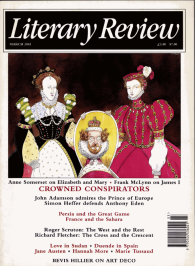Christopher Ondaatje
At Least He Had A Conscience
Carnegie
By Peter Krass
John Wiley & Sons 612pp £24.50
THE STORY OF Andrew Carnegie (1835-1919), the Scottish immigrant's son who arrived in America with nothing and rose from the slums of Pittsburgh to become the wealthiest man in the world, embodies the American dream. This is the ultimate tale of the 'poor boy made good' - and a tale made even better by his giving all his fortune away. In doing so he set the gold standard for future philanthropists. The development of his belief in unrestrained capitalism and the growth of his steel empire coincided closely with the industrial development of the USA itself, and this gives his life still more of the quality of fable.
But Carnegie's life also embodied the harsh reality of the American dream. He was a robber baron, a ruthless capitalist who lived in luxury while his mill workers laboured seven-day weeks in hellish conditions. He wanted to be a champion of the working people, but once he gained power, he

Sign Up to our newsletter
Receive free articles, highlights from the archive, news, details of prizes, and much more.@Lit_Review
Follow Literary Review on Twitter
Twitter Feed
Russia’s recent efforts to destabilise the Baltic states have increased enthusiasm for the EU in these places. With Euroscepticism growing in countries like France and Germany, @owenmatth wonders whether Europe’s salvation will come from its periphery.
Owen Matthews - Sea of Troubles
Owen Matthews: Sea of Troubles - Baltic: The Future of Europe by Oliver Moody
literaryreview.co.uk
Many laptop workers will find Vincenzo Latronico’s PERFECTION sends shivers of uncomfortable recognition down their spine. I wrote about why for @Lit_Review
https://literaryreview.co.uk/hashtag-living
An insightful review by @DanielB89913888 of In Covid’s Wake (Macedo & Lee, @PrincetonUPress).
Paraphrasing: left-leaning authors critique the Covid response using right-wing arguments. A fascinating read.
via @Lit_Review